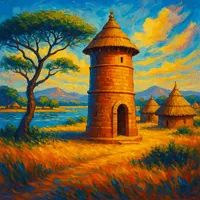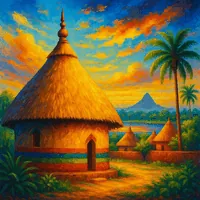Malakal, nestled along the banks of the White Nile, is uniquely characterized by its confluence of cultural diversity and resilient spirit amidst challenges. This city, once South Sudan's second-largest, mirrors the intricate tapestry of South Sudanese ethnic groups, including the Shilluk, Dinka, and Nuer, all cohabitating within its historical expanse. Its distinctive reed houses, built to withstand the seasonal floods, showcase an architectural adaptiveness to nature's rhythm rarely seen elsewhere in the world.
Notable points about Malakal
- Historic Significance: Malakal is rich in history, serving as a key strategic location during conflicts in South Sudan, including the Second Sudanese Civil War. Its historical importance makes it a fascinating destination for history enthusiasts interested in understanding the dynamics of the region.
- Cultural Diversity: Malakal is a melting pot of cultures, with a diverse population comprising various ethnic groups, including the Shilluk, Dinka, and Nuer. This diversity offers a unique cultural experience for visitors eager to explore traditional South Sudanese customs, languages, and crafts.
- White Nile River: Located on the banks of the White Nile, Malakal provides stunning views and opportunities for water-based activities. Nature lovers and adventure seekers can enjoy boating, fishing, and picturesque riverbank picnics.
- Reconstruction Efforts: As a city that has experienced significant conflict, Malakal's ongoing reconstruction efforts highlight resilience and hope. This aspect is appealing to those interested in humanitarian work, urban development, and studying post-conflict recovery strategies.
- Healthcare Hub: Malakal is home to one of the main regional hospitals, offering insights into the healthcare challenges and initiatives in South Sudan. Medical professionals and volunteers can find valuable opportunities to contribute to the region's healthcare development.
- Education Opportunity: The presence of educational institutions, such as the Upper Nile University, makes Malakal a center for higher education in the region, drawing students and academics from across South Sudan and beyond.
- Unique Climate: Malakal is known for its tropical savanna climate, characterized by distinct wet and dry seasons. Weather enthusiasts can study and experience a climate that differs significantly from the arid or semi-arid regions often associated with other parts of the country.
- Local Cuisine: Food lovers will be intrigued by the local gastronomy, which showcases a blend of traditional ingredients and flavors unique to the region. Street vendors and local markets in Malakal offer an authentic taste of South Sudanese cuisine.
- Centripetal Location: Unlike other South Sudanese cities, Malakal’s location makes it a pivotal point for river and land-based transport, providing a gateway to the northern regions of South Sudan. This accessibility appeals to logistics companies and transport enthusiasts.
- Community and Connection: For those seeking a sense of community, Malakal offers opportunities to engage with friendly locals and experience traditional South Sudanese hospitality, making it an inviting place for singles and couples looking to connect with new cultures and people.


